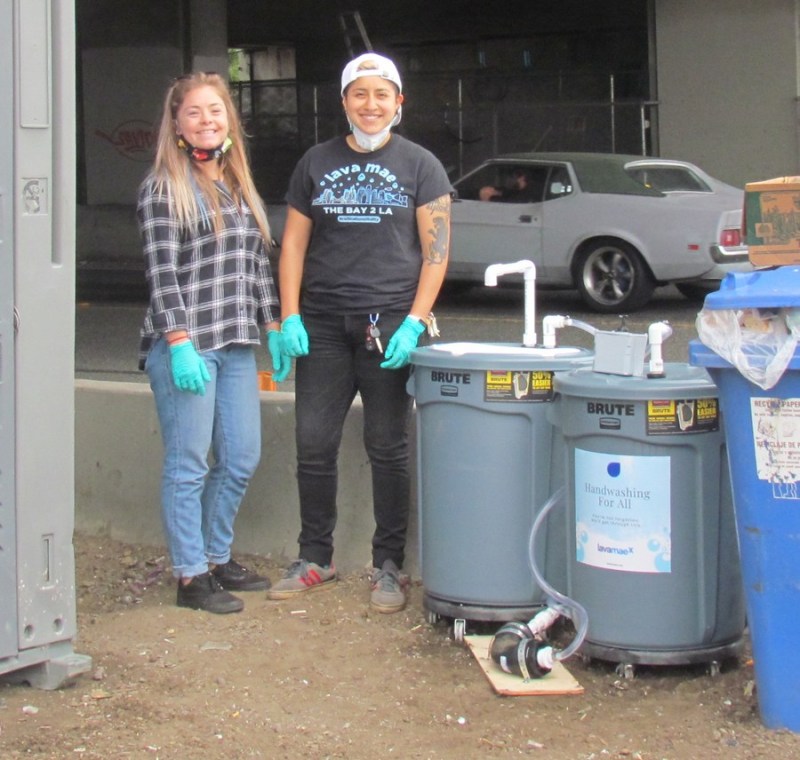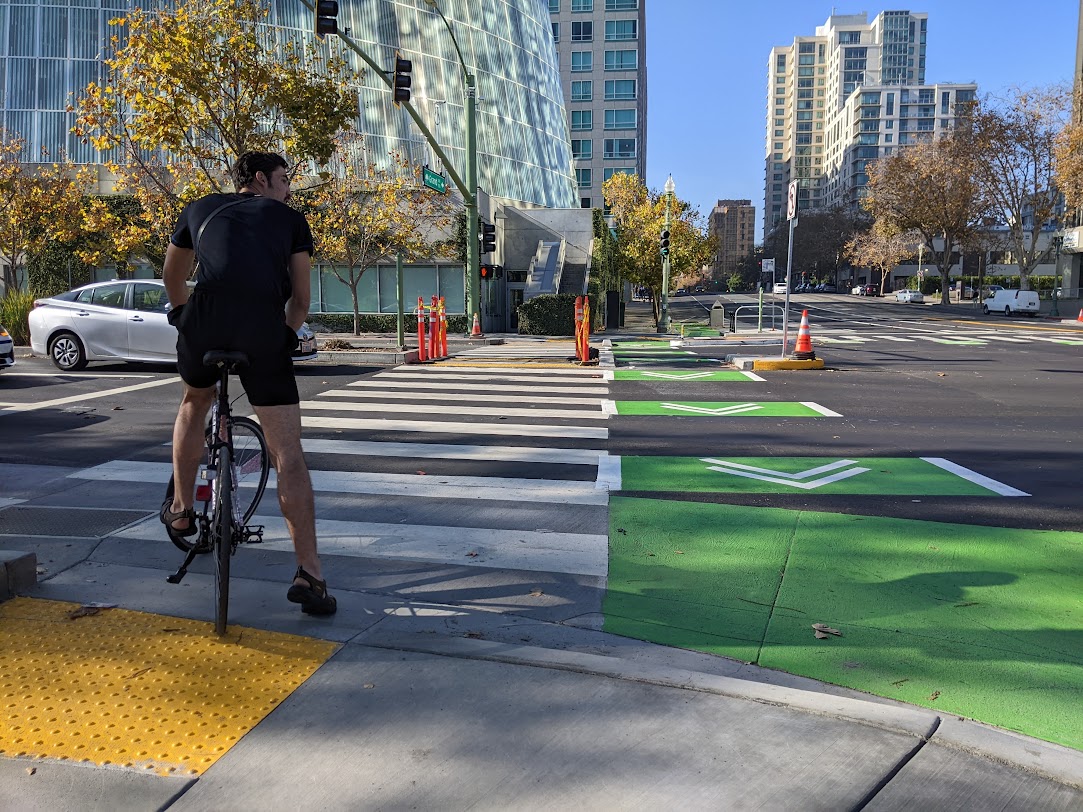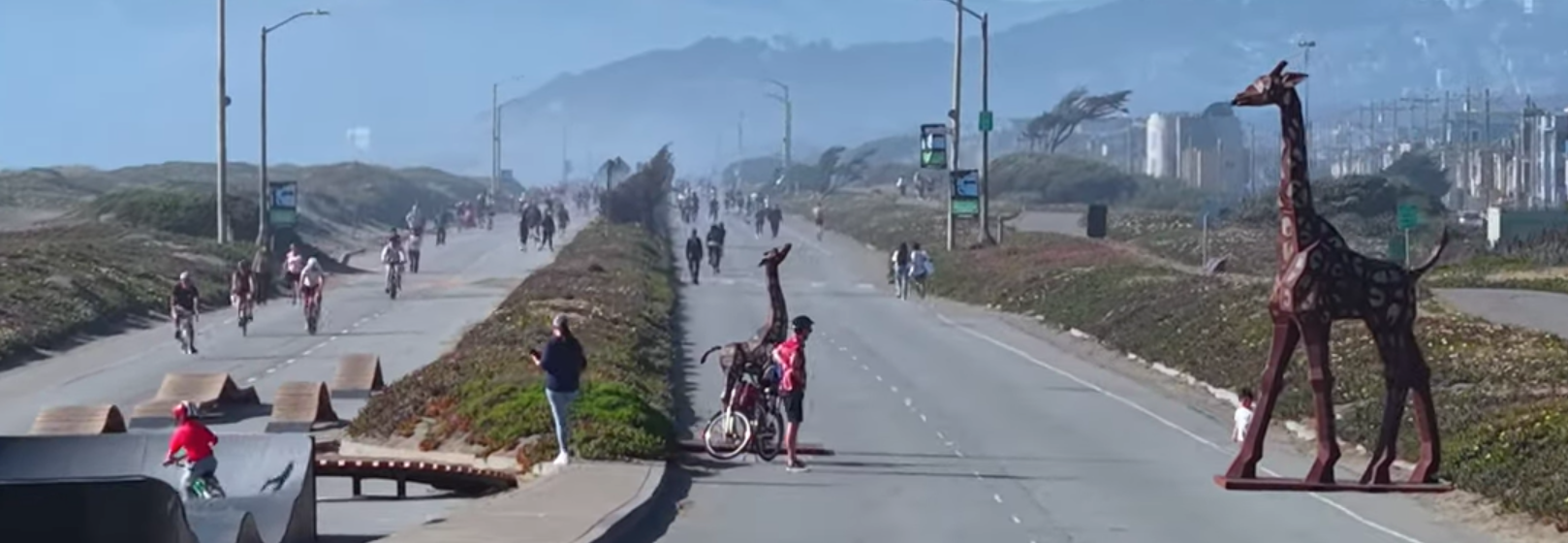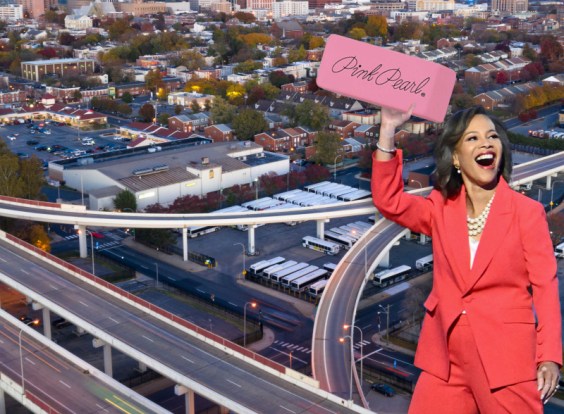Water, soap, twenty seconds: the first thing we all had pounded into our heads when the coronavirus hit was how important it is to thoroughly wash our hands. But that's not so easy to do when you are living on the streets, where access to services - including water - is limited.
LavaMaeX - the group that outfitted a bus as a mobile shower unit and took it around the state to provide a chance to get clean to people living without shelter - has developed a DIY mobile sink to bring hand-washing access to people who don't have it right now.
Yesterday, a team delivered the first of the stations to two homeless encampments in Berkeley, where people have loosely organized themselves into communities under the freeway. Ignoring the tremendous roar of the freeway traffic overhead, they filled a barrel with clean water from a nearby hydrant.
Then they wheeled the entire unit - two barrels, one full of water, one empty, all connected by a pipe running through a foot pump that was attached to a wooden base - across rough pavement to install it near a portapotty the city has provided next to the camp. Between trash barrels and the toilet, surrounded by fast traffic, it's not exactly a romantic place to ponder the beauty of nature while cleaning your hands.
But it works. After making a few adjustments to the foot pump so it wouldn't leak, and there was a quick celebration - no high-fives these days - for a successful installation.
The stations are simply designed, with inexpensive and readily available materials, including a faucet and a sink pan in addition to the barrels and the foot pump. The idea is to be able to make something simply and cheaply so they can be quickly and easily deployed widely.
LavaMaeX offers instructions and technical assistance for groups that want to arrange for something like this in their communities.
"We saw an incredible need for widespread handwashing access," Kris Kepler of LavaMaeX told Streetsblog. They have not been able to deploy their mobile shower units, needed as they are, until they can figure out how to do so safely. So they began to look for mobile handwashing stations as a temporary measure. What they found was that "large capacity handwashing stations were either nowhere to be found, or expensive to rent or to buy," said Kepler. And the ones they could find to buy were all on back order.
They discovered another group, called Love Beyond Walls, that was delivering five-gallon readymade mobile sinks sinks to communities throughout the country. "They came preassembled from the manufacturer," said Kepler. "We were inspired by that, and also by an initiative between students at USC and the Los Angeles Community Action Network, who created a program to bring handwashing stations to unhoused people. We thought: why not create some of these, and then teach people how to make their own?"
"Our philosophy is radical hospitality," she said, "to bring an unexpected level of care to the street."
Their mobile shower services, which until the pandemic descended upon us had served San Francisco, Oakland, and Los Angeles weekly, provided much-needed hot showers to people living in tents, but it became much more than that. Recently the group had begun providing technical assistance and training for others who want to set up mobile hygiene services in their communities. "We serve people, but we're also a training ground for others," said Kepler.
"It is an opportunity to connect and engage the community, and to deliver services to the unhoused, especially ones that center around hygiene and other complementary services," said Kepler. "You could deliver food, medical services, hygiene kits, information - it's an anchor to bring people together to mobilize and bring education."
Providing showers is difficult right now, until the group can obtain personal protective gear and figure out cleaning and sanitizing protocols. Even the ventilation in their trailers--which have replaced the original bus--has to be considered, to keep air flowing through the space. And they have to figure out line management.
"We typically have anywhere from ten to twenty people outside, waiting, and talking," said Kepler, "so we have to make sure we are appropriately managing that."
"We are doing a lot of research, and seeking advice from health experts. We're taking this very seriously to make sure our guests are safe and we're not spreading the virus," she said. "At the same time, people are very anxious, and isolated, and they are seeing resource depleted as nonprofits have had to shut down," so these services are even more important than usual.
For now, LavaMaeX concentrating on building and deploying the hand-washing stations, which hold 32 gallons and can provide up to 500 hand-washings before needing a refill. They are testing out the concept to see what kinds of issues crop up so they can help other groups replicate them successfully. The stations can't just be plopped down and forgotten. They need basic maintenance, including some access to clean water and a way to safely drain the gray water that collects in the empty barrel beneath the sink pan.
Reardon has a plan for collecting the grey water in a truck so it can be taken to a place where it can be legally and safely disposed of. The proximity of the fire hydrant they used as a source of water at the Gilman camp makes refilling the clean water barrel, at least, a relatively simple task.
But having to drag the unit across rough pavement, protected only by a long, faded crosswalk from traffic coming down a freeway offramp highlights some of the difficulties and dangers inherent in living unsheltered. The residents of the Gilman camp, living in tents lining a sidewalk where Caltrans and the city have tried to block them from sheltering under the freeway, have to contend with the noise and foul air from the traffic roaring overhead in addition to lack of access to just about everything a person needs for survival.
But they're not completely without support. During the time the LavaMaeX team spent setting up the sink, several people, including one small family, arrived to deliver a box of food, which camp manager Lewanda put on a nearby table for residents to take.
Andrea Henson, of unsheltered advocacy group Where Do We Go, Berkeley, enthusiastically greeted the installation and did a quick livestream on Facebook, then checked in with residents of the camp. Henson also told them that Dignity on Wheels will begin offering hot showers and laundry services for unsheltered people in Oakland and Berkeley starting next week.





